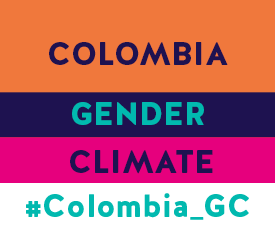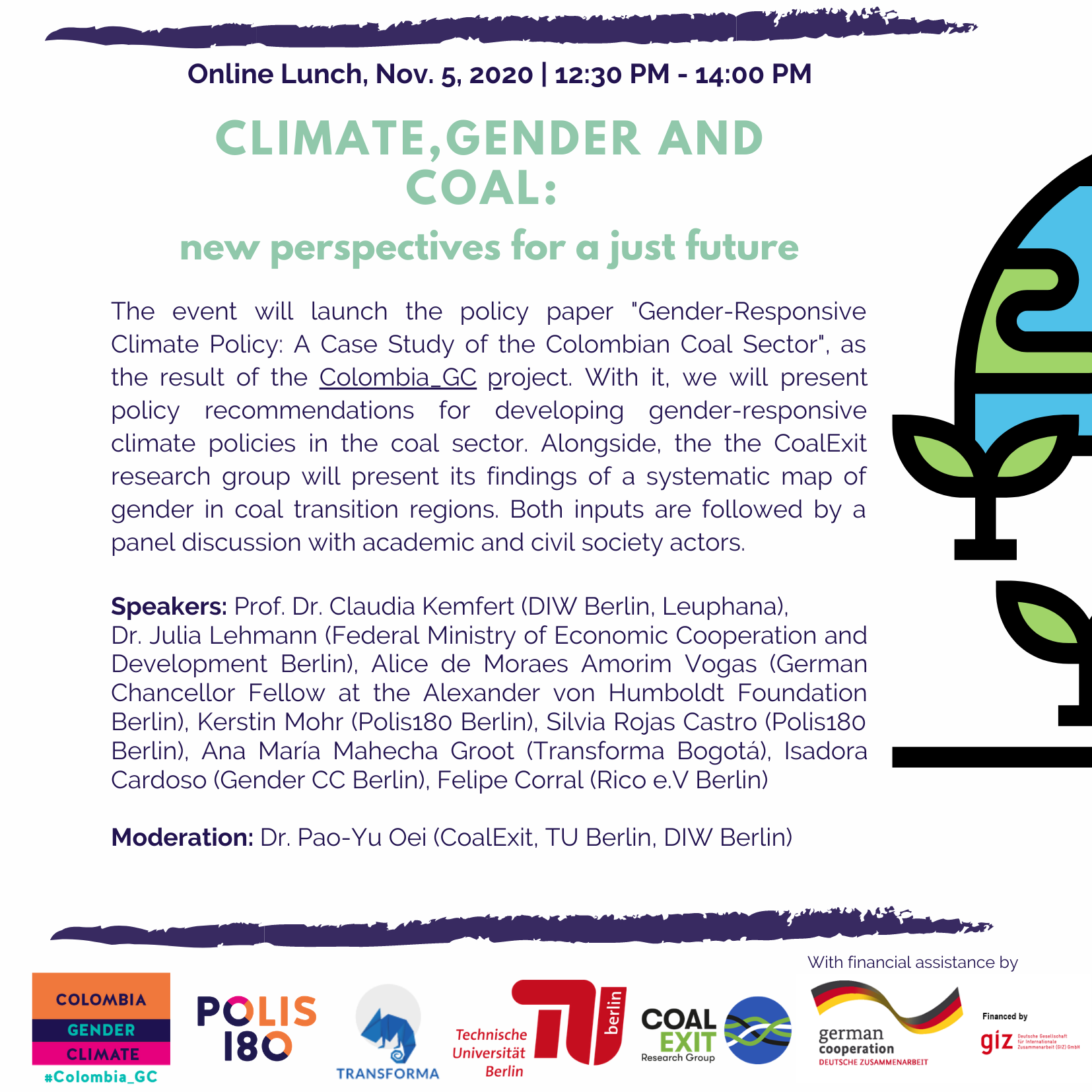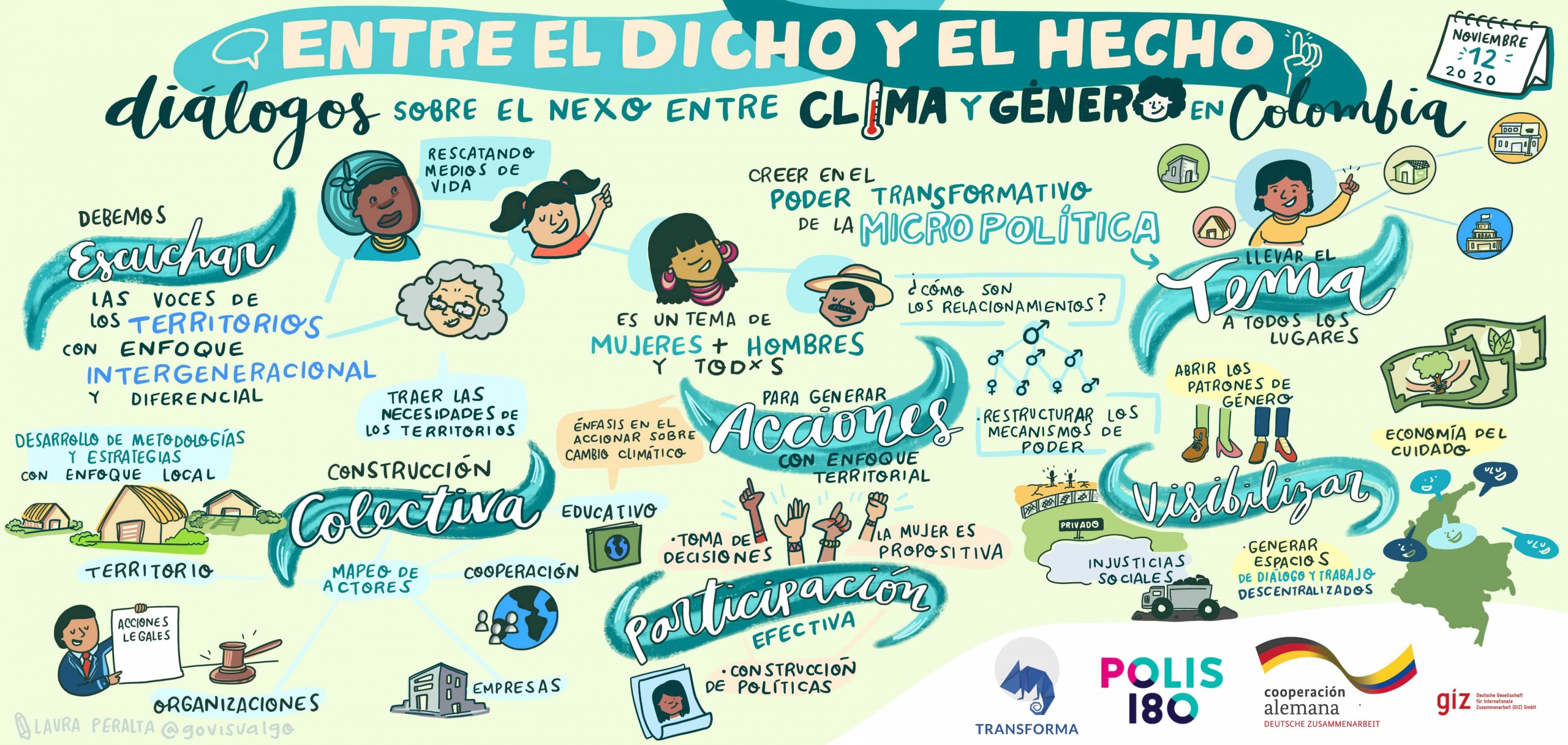
Colombia, Gender and Climate:
Women as Actors for Transformation #Colombia_GC

Why Gender and Climate?
In order to create the basis for a sustainable and just future, climate crisis and gender justice must be approached jointly in policy making. However, there is still little knowledge on how these two factors can be linked in gender-responsive climate crisis policies.
Why Colombia?
While gender has featured prominently in the country’s political agenda, the interrelation between gender aspects and climate crisis in Colombia is still under-researched. As climate crisis functions as a multiplier of existing inequalities and risks, the creation of a gender-responsive climate crisis policy in the Global South is all the more important. The question of how Colombia will use its resources in the future is one of the central questions of the country’s climate policy and therefore one of the key points for the creation of a gender-responsive climate policy.
Why this Project?
“Colombia_GC” addresses the current knowledge gap by analyzing the Colombian energy sector. It provides knowledge on the benefits of gender-responsive climate crisis policies and identifies hindering and enabling factors for its creation. It puts a special focus on the role of women as actors of transformation. In order to provide a comprehensive and high quality study, we work in close cooperation with local partners and use an inter- and transdisciplinary research approach. Policy recommendations will be derived from the scientific results.
Any questions? Contact us here.
Partner
For this project, we cooperate with the Colombian NGO Transforma.
Outputs
- Publication of a policy paper in English and Spanish, based on inter- and transdisciplinary research
- Release of an executive summary with policy recommendations for decision makers in Colombia and Germany, published in English, Spanish and German
- Launch events in Bogotá and Berlin
- Blog and social media posts
Colombia, Género y Clima: Mujeres como agentes de cambio #Colombia_GC

¿Por qué el género y el clima?
A fin de sentar las bases para un futuro sostenible y justo, las políticas publicas deben abordar conjuntamente el cambio climático y la justicia de género. No obstante, todavía se sabe poco sobre cómo vincular estos dos factores en las políticas de cambio climático con una perspectiva de género.
¿Por qué Colombia?
Si bien el género ha ocupado un lugar cada vez más relevante en la agenda política del país, la interrelación entre los aspectos de género y el cambio climático todavía no se ha investigado lo suficiente en Colombia. Dado que el cambio climático funciona como un multiplicador de las desigualdades y los riesgos existentes, la creación de políticas de cambio climático con perspectiva de género en el Sur Global es aún más importante. La cuestión de cómo utilizará Colombia sus recursos naturales en el futuro es uno de los aspectos cruciales de la política climática del país y, por lo tanto, uno de los puntos clave para la creación de una política climática con perspectiva de género.
Objetivos del proyecto
Con „Colombia_GC“ abordamos esta brecha de conocimiento analizando el sector energético colombiano. Asimismo, buscamos proporcionar conocimiento sobre los beneficios de las políticas de cambio climático con perspectiva de género, identificando los factores que obstaculizan y favorecen su creación. El proyecto hace hincapié especialmente en el rol de las mujeres como agentes de cambio. Con el fin de proporcionar un estudio exhaustivo y de alta calidad, trabajamos en estrecha cooperación con organizaciones locales y utilizamos un enfoque de investigación inter y transdisciplinario. A partir de estos resultados, realizaremos recomendaciones de política pública.
Para mayor información contáctenos aquí.
Socio
Para este proyecto, cooperamos con la ONG colombiana Transforma.
Resultados
- Publicación de un documento de política pública en español y en inglés, basado en investigación inter y transdisciplinaria
- Lanzamiento de un resumen ejecutivo con recomendaciones de política pública para tomadores de decisiones en Colombia y Alemania, publicado en español, inglés y alemán
- Eventos de divulgación en Bogotá y Berlín
Project Team

Kerstin Manuela Mohr (Project Lead) studied Governance & Public Policy and Political Science in Germany, Brazil and Colombia. She works as a consultant in international climate protection and is currently writing her doctoral thesis on climate change governance in Colombia. At Polis180, Kerstin is co-head of the program area „Climate and Energy“.

Silvia Rojas-Castro (Research Associate) is a Colombian lawyer based in Berlin who has worked as a researcher in the topics of human and women’s rights, transitional justice, and climate change. In 2019, she published with Polis180 the Policy Brief „Gender in Peace Agreements: Lessons from Colombia“.

Kathrin Meyer (Student Assistant) studied Political Science, Sociology & Environmental Science in Germany, Spain, Cuba and Colombia. She is currently enrolled in the Master’s program „Interdisciplinary Latin American Studies“ at Freie Universität Berlin. Previously, she has published articles at EnergyTransiton.org on resource dependence and energy policy in Latin America.
Project term
01.12.2019-30.11.2020
The project is financed by

Photos by Dulcey Lima Unsplash, Dominik Vanyi Unsplash, Markus Spiske Unsplash




